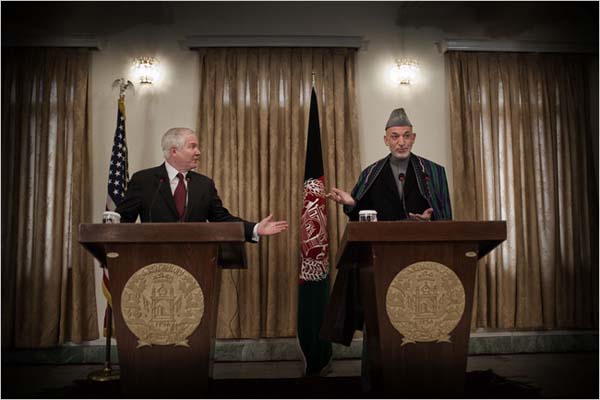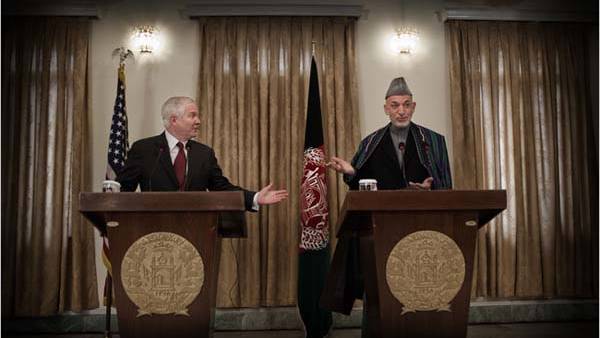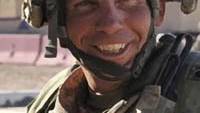Karzai Says Afghan Army Will Need U.S. Until 2024
Source: infowars.com
President Hamid Karzai said Tuesday that Afghanistan would not be able to pay for its own security until at least 2024, underscoring his government’s long-term financial dependence on the United States and NATO even as President Obama has pledged to begin withdrawing American troops in 2011.Mr. Karzai spoke at a news conference here with Secretary of Defense Robert M. Gates, who did not put a timetable on the American and allied financial commitment but acknowledged that there was a “realism on our part that it will be some time before Afghanistan is able to sustain its security forces entirely on its own.”

Secretary of Defense Robert M. Gates, left, and President Hamid Karzai of Afghanistan at a news conference. Mr. Gates held out the possibility that a future improvement in Afghanistan's finances would defray some of the costs of building up Afghan forces to take over significant security duties. Image: Adam Ferguson
The news conference came just hours after as many as a dozen people were killed during an allied raid in Laghman Province, Afghan officials said, prompting hundreds of villagers to march in protest.
The early morning operation outside the provincial capital, Mehtar Lam, east of Kabul, happened “without any coordination with the Afghan forces or Afghan officials,” said Sayed Ahmed Safi, a spokesman for the governor of Laghman. He said one woman was among the dead, which included civilians as well as insurgents, all killed by small-arms fire. He said the troops also detained four men.
After Afghan security forces blocked marchers from entering Mehtar Lam, gunfire broke out, killing one protester and wounding two others, he said.
NATO confirmed the raid and said that seven militants were killed but that there were no “reports to substantiate those claims of harming civilians, including women and children.”
The target of the raid was a Taliban bomb maker. A military spokesman said he did not know whether the troops involved were American or from another NATO country.
The Afghan Interior Ministry said a delegation had been sent to investigate, and urged residents not to resort to violence.
If the civilian dead are confirmed, the raid would be one of the worst recent episodes resulting in civilian casualties, which have engendered antipathy toward American and NATO forces among Afghan citizens and officials.
The American commander in Afghanistan, Gen. Stanley A. McChrystal, tightened rules on airstrikes last summer in an effort to reduce civilian casualties.
But while civilian casualties continue to anger Afghan officials, Mr. Karzai’s comments on Tuesday highlighted just how much the government could be forced to rely on the United States and other NATO countries for decades to come.
“For another 15 to 20 years, Afghanistan will not be able to sustain a force of that nature and capability with its own resources,” Mr. Karzai said, referring to the force required to secure the entire country.
The subject was one of the main reasons that Mr. Gates arrived here Tuesday on an unannounced visit. He said a major topic of discussion with Mr. Karzai would be how fast the Afghans could recruit, train and retain their own security forces, the key to the planned American withdrawal that is supposed to begin in July 2011.
The price of building up Afghan forces to take over significant security duties could be enormous. Some estimates say it will take up to $50 billion over five years to increase army and police rolls to 400,000, the level sought by General McChrystal.
At the news conference, Mr. Gates held out the possibility that a future improvement in Afghanistan’s finances would defray some of the costs.
“Whether that is 15 or 20 years, we’ll hope for accelerated economic development in Afghanistan,” he said, adding that “as the Afghan economy expands, then the proportion of the costs of supporting the Afghan security forces will diminish.”
He also said there was a possibility that the size of Afghan security forces could shrink, “as is often the case after the end of a conflict.”
Mr. Gates, the first member of Mr. Obama’s national security team to travel to Afghanistan since Mr. Obama announced last week that he would send an additional 30,000 troops to the country, told reporters en route to Kabul that he had already signed orders for the deployment of 17,000 additional personnel, and that most would be in place in southern Afghanistan by the spring.
Included in the group are 1,500 Marines from Camp Lejeune, N.C., who will deploy later this month; an additional 6,200 Marines from Camp Lejeune, who will deploy in early spring; and a brigade combat team of about 3,400 soldiers from the 10th Mountain Division at Fort Drum, N.Y., who will also deploy next spring to train Afghan security forces.
Mr. Gates said that one “eye opener” for the Americans was learning that the Taliban often paid their militia fighters more than the Afghan government paid its soldiers and police officers, and that a pay increase for the Afghan security forces was crucial to building them up.
Another problem, Mr. Gates said, was that the Afghan security forces were spread far too thin. “Attrition is higher in the areas where the combat is heavier,” he said. “The reason is there aren’t enough of them. And they basically fight until they die, or they go AWOL.”
Rotating in more Afghan soldiers, he said, “would be an important part of the retention piece as well.”
Asked if it was not “late in the game” in an eight-year-old war to begin learning these facts about Afghan security forces, Mr. Gates replied that “there’s a lot of this that’s late in the game, frankly.”
Article from: NYTimes.com
Video from: YouTube.com






















